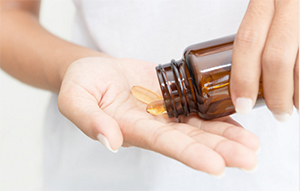Q&A: Can Fish Oil Help My Child’s ADHD?

Question: My daughter is seeing a psychologist for some problems she's had at school. The doctor thinks she likely has ADHD and is suggesting she start taking medication. I've heard so much negative information about ADHD medication, but my friend says that fish oil or omega-3s could replace prescription medication. Is this true? How much should my daughter take to treat ADHD?
―Mother in Michigan
Answer: Fish oil, made from the tissue of oily fish―such as salmon, trout, and tuna―contains high concentrations of omega-3 fatty acids. Research in the past 10 years has shown that omega-3 fatty acids can help to reduce inflammation in the body and improve symptoms of cognitive disorders, including ADHD. This research is ongoing, and we are learning more about the health benefits of omega-3s, especially in our diets. However, none of the current research has shown that using supplements is as effective as medication for ADHD or that it could replace the currently recommended treatment.
The research from multiple controlled studies has shown mixed results. In these studies, some children had a modest improvement in their symptoms and related behavior and academics. Other studies have noted that there were improvements in children’s symptoms, as reported by their parents. A smaller group of children showed small improvements in their symptoms while taking the supplements. All of these studies used different dosages and sources of the supplements, making it difficult to draw specific recommendations to effectively address ADHD symptoms.
So far the results have not shown that omega-3 supplements can replace medication as a treatment for ADHD. Many professionals are happy to talk with patients or their parents about adding supplements to their diets as a complementary approach, along with behavioral management and medication management. For your daughter, it is best to discuss current research with her prescribing doctor before adding fish oil or omega-3 supplements to her diet.
Many families already include fish in their diets. The American Heart Association suggests having a serving of fish twice a week. Omega-3 fatty acids can also be found in beef, milk, and butter from grass-fed and pastured cattle. Non-animal sources include flaxseed, chia seeds, and walnuts. These foods, along with fish, can be healthy additions to your diet.
Looking for more information? Read up on the research at Fish Oil Supplements and ADHD.
Do you have a question about ADHD or are you looking for a resource? Contact our Health Information Specialists at 866-200-8098, Monday through Friday, from 1-5 p.m. Eastern Time. Or join the discussion at Questions & Answers.
Tell us what you think. Comment on this article.
